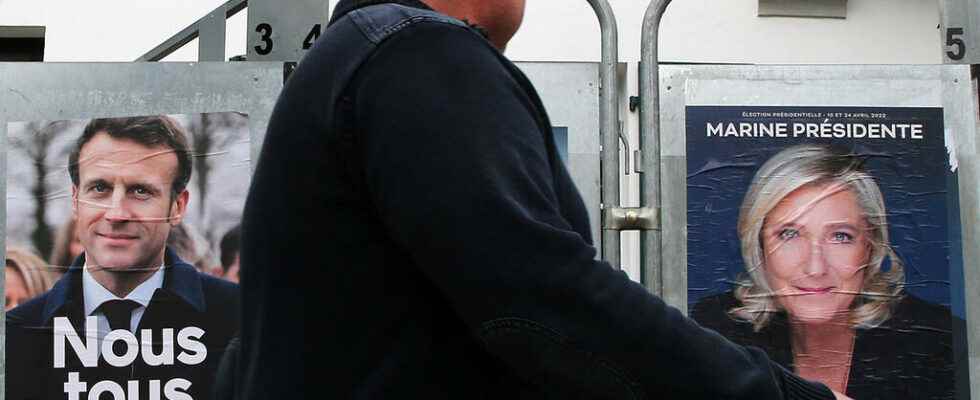The French are called to vote this Sunday, April 24 to decide between the two finalists of the presidential election: the outgoing head of state Emmanuel Macron and the candidate of the National Rally Marine Le Pen. Their projects for the European Union and their relations with Russia against the background of the war in Ukraine.
“The battle we are waging is not only a battle for France, it is a battle for Europe ». On April 12 in Châtenois (Bas-Rhin), Emmanuel Macron appears as a convinced European. While France holds the presidency of the Council of the European Union until June 30, the outgoing head of state is campaigning for a stronger and more protective Europe.
Emmanuel Macron pleads for reinforced military capacities in the armies of the Member States, for an autonomy “ energetic and strategic from the continent and wishes to pursue the reform of the Schengen area with better protection of Europe’s external borders and the establishment of a common reception policy. His project is that of national and European sovereignty “, he summed up during the debate between the two rounds Wednesday April 20, in opposition to that of his rival whom he accuses of ” want to stand apart when leaving the EU.
A “European Alliance of Nations” to replace the EU
” I want to stay in the Union, but profoundly change it “retorted Marine Le Pen. Because if the candidate of the National Rally (RN) no longer speaks as in 2012 of leaving the EU or the euro, she aims to reform the treaties in depth to establish “ a European Alliance of nations which aims to gradually replace the EU “.
Marine Le Pen intends to affirm the superiority of national law over European law, a position also advocated in Poland which is worth in Warsaw an infringement procedure launched by the European Commission. The RN candidate also wants to lower the French contribution to the European budget by 5 billion euros, restore permanent controls at the borders of the Member States and opposes the European Defense project wanted by Emmanuel Macron.
Another file, much more burning: that of the war in Ukraine. The campaign of the RN candidate was almost weighed down by a photo dated March 24, 2017 which shows her, all smiles, shaking hands with Vladimir Putin in Moscow. The candidate’s admiration, repeated many times in the past, for the Russian president could have been fatal to her after Russia entered the war in Ukraine. From the start of the conflict, Marine Le Pen changed her discourse: “ I consider that what he [Vladimir Poutine] has done is eminently reprehensible, it partly changes the vision I can have of him “.
If Marine Le Pen therefore decides for a ” Free Ukraine “, her detractors do not fail to recall her positions on Crimea, the annexation of which she has never condemned by Moscow – “ I don’t believe there was illegal annexation, she said in 2017. There was a referendum, the inhabitants wanted to join Russia – and which earned him a ban on staying in Ukraine. ” If the candidate understands that she was wrong, our relationship could change said Ukrainian President Volodymyr Zelensky.
Telephone diplomacy with the Kremlin
Another embarrassing file for the RN candidate: the loan of 9 million euros taken out by her party in 2017 from a Russian bank and which the training continues to repay. ” You depend on Russian power and you depend on Mr. Putin »,accused Emmanuel Macron during the debate between the two rounds. You talk to your banker when you talk about Russia, he continued. That is the problem ». The candidate rejects the accusations and affirms that no French bank had made her a loan at the time.
Marine Le Pen assures that she owes nothing to Vladimir Poutine. And if she wants a strategic rapprochement between Russia and NATO, it is, she says, only once the war is over in Ukraine. The RN candidate adds that her desire to dialogue with Vladimir Putin is not far from the “telephone” diplomacy practiced by Emmanuel Macron.
Since his arrival at the Élysée in 2017, Emmanuel Macron has always advocated dialogue with Moscow. Witness his invitation to Versailles, the year of his election, then to Fort de Brégançon in 2019, ahead of the G7 summit. A line he has not abandoned since the start of the war. Despite the absence of concrete results, Emmanuel Macron considers it necessary to maintain contact with the Kremlin. In the uncertain hope of a mediating role the day the guns fall silent.
